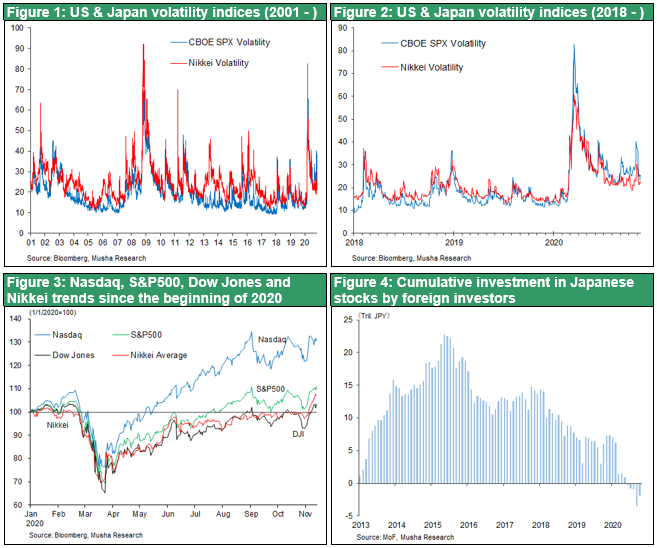Nov 13, 2020
Strategy Bulletin Vol.265
New York stocks become more speculative, but Japanese stocks are in a safe zone
US Stock Market Becomes More Speculative Under Policy Uncertainty
The market environment changed rapidly around the time of the US presidential election, and the financial markets are losing their sense of direction. US equities are on the verge of an all-time high around the election and have alternated between sharp rises and falls. Conflicting movements have also been seen between sectors such as growth stocks and value stocks and between the Dow 30, the Russell 2000 and the NASDAQ. Long-term interest rates and foreign exchange rates are also not moving in unison.
Immediately after the election, long-term interest rates fell and the NASDAQ, which is mainly composed of growth stocks, rebounded sharply on the assumption that fiscal stimulus would be curtailed and pressure for monetary easing would increase based on the assumption that Biden would win the election, but that Republicans would win the Senate. However, long-term interest rates rose sharply when the positive results of Pfizer's vaccine trials were announced, on speculation that COVID-19 control would speed up the economic recovery, and the NASDAQ, which is mainly composed of growth stocks, plummeted. On the other hand, the Dow, which is mainly composed of value stocks, reached an all-time high. In line with the surge in interest rates, the dollar, which had sold off to 103 yen, rose to 105-yen levels.
The turbulence may be a sign that the US financial markets are at some kind of turning point. While there is certain to be an economic recovery in 2021, there is a great deal of policy uncertainty (i.e., (1) Biden's policies, which will be new rules of the game, are unclear, (2) the policy toward China is also unclear, and (3) how the energy policy will change), making it difficult to determine investment scenarios. We believe that speculative movements in the US financial markets will continue on the back of abundant liquidity and investment funds.
Japanese stocks are becoming more stable and quietly reaching post-bubble highs
In the midst of all this, the Nikkei 225 suddenly surpassed the 24,000-yen level to reach a new post-bubble high. This shows a clear direction for Japanese stocks. Of particular note is the stability of Japanese stocks. In contrast to US stocks, there has been a comparatively large decline in Japanese stock volatility, making Japan a low-risk market. In September-October 2020, volatility in Japanese stocks stood at 3%, compared to 10% in US stocks. Japanese stocks have gone from one of the world's most dangerous zones to a safe zone.
Throughout the 2010s, the Japanese stock market had high volatility due to pronounced speculation, making it difficult for investors such as individuals to approach. This was because foreign investors, who account for 70% of turnover, were mainly speculative (trading) players. However, a sense of calm appears to have been restored to the Japanese market as these speculators migrated to the New York markets.
Low interest rates in the US (i.e., excess returns on stocks) are attracting speculative money from around the world, and Japan is now a safe zone
Volatility (= the strength of speculation) is essentially considered to be determined by the magnitude of the excess returns on stocks. If interest rates are low and excess returns are high, investors will increase their leverage to pursue greater investment outcomes. The high returns of such highly leveraged portfolios are lost by the occasional market surge. A mechanism exists whereby the excess returns on stocks are redistributed to various market
participants, financial institutions, and investors through this volatility cost. The wild price movements in Japanese stocks throughout the 2010s can be attributed to the very large difference with stock yields (= excess returns) given the extremely low interest rates. In other words, the appeal of speculative positions was very strong.
However, US long-term interest rates have fallen sharply since the COVID-19 crisis, and the excess returns from the difference with stock yields has been even greater in the US than in Japan. We believe these large excess returns are attracting global speculative players to the US stock market. By way of comparison, in 2019, the excess return on US stocks to US treasuries was 3.0%. However, with the sharp decline in interest rates, the average excess return for March-October 2020 has jumped to 3.9%, making leveraged investing more attractive.
While Japanese stocks have quietly reached new post-bubble highs, long-term foreign investors have started to buy Japanese stocks (despite the migration of short-term speculative funds from Japan to the US). Foreign investors had bought more than 23 trillion yen in Japanese stocks since 2013 due to their assessment of Abenomics, selling everything at the beginning of 2020, but becoming net buyers from October. There are a number of factors including: (1) the small number of COVID-19 cases and the expectations that normalization of the economy will be accelerated, (2) the expectations that the recovery in China will benefit the results of global companies, (3) the assessment of the impact of the Suga reform minded administration, and (4) the inspiration provided by Warren Buffett's investment in trading company stocks. 2021, the year the Olympics, is likely to be the year when investors from around the world shift to Japanese stocks.


